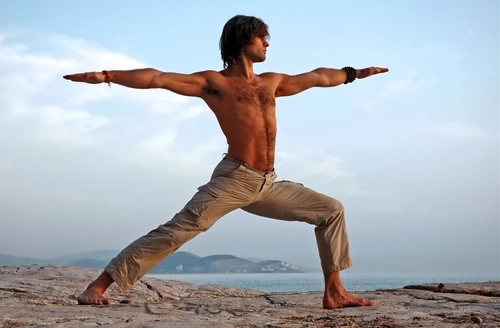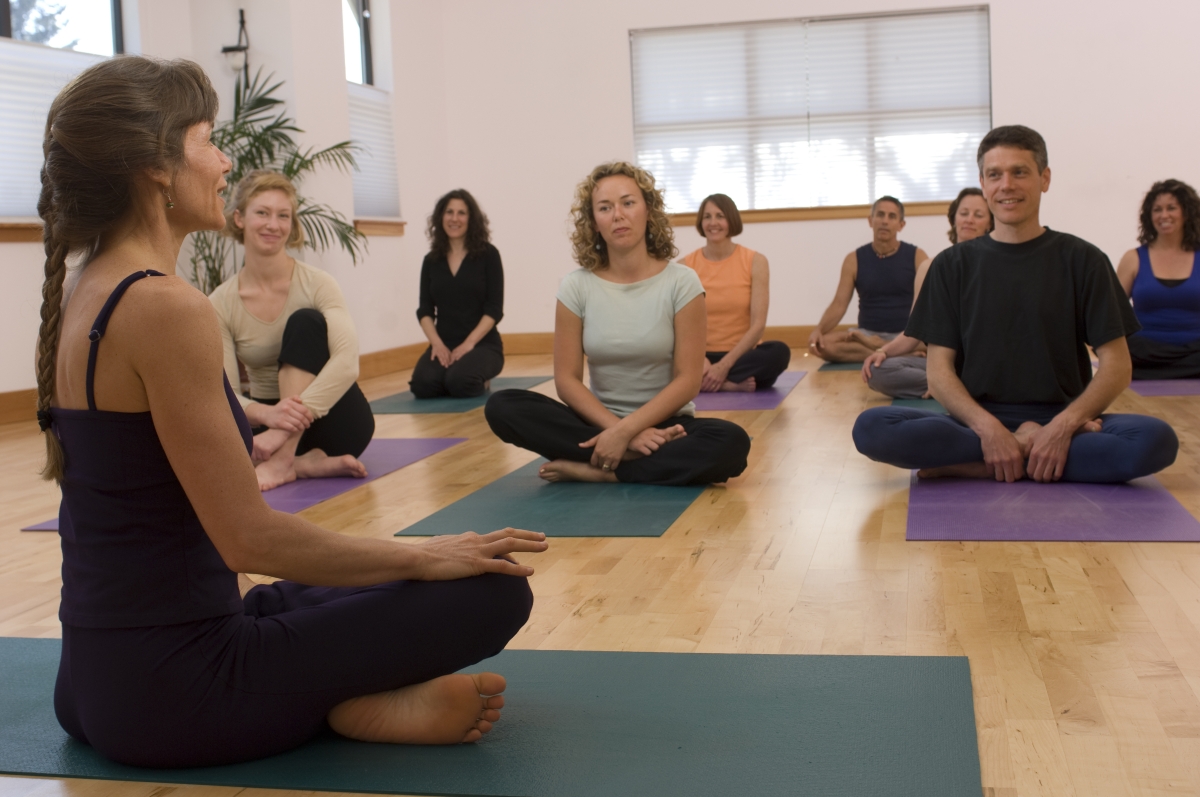Yoga in the Era of the Rock Star Yoga Teacher

I used to assume that the reason that famous yoga teachers were famous was because they were better at yoga than others. After all, every field has its exceptional geniuses: there’s lot of rock musicians out there, but a John Lennon doesn’t come along too often. So when I thought about famous yoga teachers, I fit them into this paradigm, e.g.: B.K.S. Iyengar is to yoga as the Beatles were to rock.
Certainly, in the case of Mr. Iyengar (and some others), I still think this is true. But in the past 15 years, yoga has become a multi-billion dollar “industry” and the number of famous “rock star” yoga teachers has grown proportionately. You no longer have to be a genius, who has profoundly influenced the development of modern yoga in order to achieve fame. Today, with so many yoga classes, studios, students, retreats, and products on the market, it’s a whole different ball game.
Given the enormous influence that yoga teachers can have on their students, it’s useful to reflect on the qualities that can vault a yoga teacher to prominence today.
The Rock Star Yoga Teacher: What Does It Take?
What does it take for a yoga teacher to become a famous teacher in the U.S. today? Off the top of my head, I’d suggest the following:
1) Kick-Ass Asana Chops. Teachers who can do amazing things with their bodies wow students. It’s impressive, exciting, and can be inspiring. Also, because so many Americans assume that yoga is asanas, pure and simple, being able to do advanced poses is taken to mean being “good at yoga” as a whole. 
2) Good Looks. Our society places a huge premium on physical attractiveness. Particularly for women, fitting into mainstream standards of what’s considered beautiful generates attention and admiration. While men have a bit more leeway, it certainly doesn’t hurt them to be good looking, either.
3) Charisma. While harder to identify than beauty or asana chops, charisma is actually much more important. Max Weber classically defined charisma as “a certain quality of an individual personality, by virtue of which he is set apart from ordinary men and treated as endowed with supernatural, superhuman, or at least specifically exceptional powers or qualities . . . not accessible to the ordinary person.” Powerful in any field, charisma is a particularly good fit with yoga, where students are primed to search for a guru, teacher, or leader who can guide them toward the transformation that more powerful forms of the practice can provide.
4) Business Savvy. As the yoga industry, like American society in general, has become more competitive, business savvy has become increasingly important. Yoga teachers need to make a living, too. But with zillions of recent yoga teacher training grads, not to mention Pilates, Zumba, spinning, and other popular fitness options competing for the potential yoga student’s time and money, how does the individual teacher stand out from the crowd? It’s not easy. Having a good head for business helps.
Is That It?
Am I suggesting that all famous yoga teachers are simply charismatic, attractive gymnasts with a strong business sense? No. I myself have studied with several famous yoga teachers who were famous for good reasons – e.g., they had a depth of knowledge about yoga and ability to communicate it to students that was simply exceptional.
I do think, however, that in today’s environment, these are the qualities that will help someone become “successful” in the sense of being able to attract big numbers of students to their classes, teach nationally or even internationally, sell DVDs or other tie-ins, etc. The qualities of exceptional athleticism, good looks, charisma, and business savvy dovetail with what American culture values more generally.
 I’ve experienced this directly myself. About 18 months ago, I stopped attending the yoga class I’d been going to for years and spent a few months experimenting with new classes. What I saw made a big impression on me.
I’ve experienced this directly myself. About 18 months ago, I stopped attending the yoga class I’d been going to for years and spent a few months experimenting with new classes. What I saw made a big impression on me.
I remember going to one class with maybe 80 students packed in mat-to-mat. The teacher bounced in like a radiant cheerleader: pretty, confident, eye-catching, smiling, bestowing good vibes on the crowd. She led us through a nice workout that left me feeling like I’d had some exercise, but not done any yoga. Aside from a brief New Age-y reading at the beginning and end of class, there wasn’t anything that distinguished it from a “normal” exercise class – no work with the breath, no attention to mental focus, and no meditative dimension.
Soon after that, I went to a class led by a woman who’d been teaching in the Chicago area for well over a decade. Her hair was streaked with grey and she had a quiet manner. She was not charismatic. I knew that she’d travelled to India and New York multiple times for intensive study with renowned yoga teachers. Her class had had incredible focus, energy, and depth. It had six people in it.
As I left the studio, I thought: Wow. She’s been teaching in this city for as long as I can remember and she only has six students in her class? And it was a great class! I found this surprising, and disheartening.
Ethical Ambiguity
Of course, someone can have asana chops, good looks, charisma, and business savvy in spades, and also be an incredible yoga teacher.
The problem, however, is that our culture holds these qualities up as an indicator of what’s valuable, aspirational, and admirable. We assume that someone who can float from Crow to Handstand in the middle of the room is “better” at yoga than the rest of us, who can’t imagine accomplishing such a feat.
In fact, however, the ability to perform such a pose is ethically neutral. The person who achieves it may have the personal qualities of a saint, an a-hole, or anything in between.
Similarly, we tend to see physical attractiveness as worthy of admiration in ways that it doesn’t merit at all. Particularly in the yoga world, which has a strong aesthetic sense, we tend to feel that a teacher’s beauty imbues her with other qualities that she may or may not really have: equanimity, compassion, understanding, etc.
Charisma poses the trickiest issue, because it is the most invisible yet the most powerful attribute contributing to fame. While charisma can be harnessed to truly effective teaching, it can also be used to manipulate, dominate, and disempower. All of the cult leaders who have eventually fallen from the weight of years of abuse inflicted on their students were powerfully charismatic. Charismatic leaders can twist meanings so effectively that their followers become completely out of touch with reality. This can be extremely dangerous.
Similarly, business savvy is an ethically neutral talent. It’s possible to be in business and be visionary, responsible, and positive. It’s equally possible to be reactionary, manipulative, and negative. You can succeed financially either way. Sure, it’s probably harder to stay on the high road. But it’s certainly not impossible. 
Bottom Line
The bottom line is that I no longer assume that more “successful” yoga teachers are somehow “better” at yoga than those who aren’t. I don’t hold their fame against them. But I don’t consider it a guarantee of anything that I value, either.
Conversely, I don’t assume that because a teacher has only a small number of students in her class that she’s lacking something important. (In fact, the one class that I make an effort to go to regularly is quite small.) A teacher may have small classes, because she is new, inexperienced, and not capable of leading stellar classes. But it may just as well be because she is seasoned, knowledgeable, and committed to teaching classes that are true to her practice and don’t cater to mass market tastes.
The American yoga world is changing fast. As such, it’s a particularly important time to reflect on just how ambiguous the relationship between market success and ethical substance really is. We need to think carefully into the dynamics of what makes one particular method or teacher more popular than others. Most of all, we need to question the commonly assumption that “successful” necessarily means “better.” It doesn’t.
Share Your Thoughts! Has yoga become a mile wide and an inch deep, as Judith Hanson Lasater once put it? Or is the teaching of yoga just right? Share your thoughts below (comments are moderate to avoid spam, so it may take a short while for comments to appear).
An earlier version of this article was originally posted on Think Body Electric
 Carol Horton, Ph.D., is the author of Yoga PhD: Integrating the Life of the Mind and the Wisdom of the Body (Kleio Books, 2012); and Race and the Making of American Liberalism (Oxford University Press, 2005). She is also the co-editor (with Roseanne Harvey) of 21st Century Yoga: Culture, Politics and Practice (Kleio Books, 2012). Carol holds a doctorate in Political Science from the University of Chicago, served on the faculty at Macalester College, and has extensive experience as a research consultant specializing in issues affecting low-income children and families. A Certified Forrest Yoga teacher, Carol teaches yoga to women in the Cook County Jail with Yoga for Recovery, and at Chaturanga Holistic Fitness in Chicago. To learn more, visit her website at carolhortonphd.com.
Carol Horton, Ph.D., is the author of Yoga PhD: Integrating the Life of the Mind and the Wisdom of the Body (Kleio Books, 2012); and Race and the Making of American Liberalism (Oxford University Press, 2005). She is also the co-editor (with Roseanne Harvey) of 21st Century Yoga: Culture, Politics and Practice (Kleio Books, 2012). Carol holds a doctorate in Political Science from the University of Chicago, served on the faculty at Macalester College, and has extensive experience as a research consultant specializing in issues affecting low-income children and families. A Certified Forrest Yoga teacher, Carol teaches yoga to women in the Cook County Jail with Yoga for Recovery, and at Chaturanga Holistic Fitness in Chicago. To learn more, visit her website at carolhortonphd.com.



